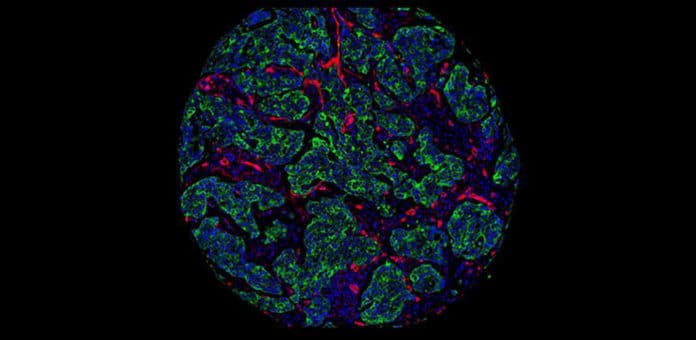Breast cancer is a disease in which certain cells in the breast become abnormal and multiply uncontrollably to form a tumor.
Recently, scientists from the University of Cambridge have created one of the most detailed maps of breast cancer ever. They created maps of breast tumor samples, with a resolution smaller than a single cell.
The maps reveal the way the cancer landscapes, consisting of cancer cells, immune cells, and connective tissue, varies between and within tumors, depending on their genetic makeup.
According to scientists, the map could help doctors with enough information about each patient’s tumor upon diagnosis. It is also expected to be used to analyze tumors during treatment. This will allow doctors to see in unprecedented detail how tumors are responding to drugs or radiotherapy.
Dr. Raza Ali, a lead author of the study and junior group leader at the Cancer Research UK Cambridge Institute, said: “At the moment, doctors only look for a few key markers to understand what type of breast cancer someone has. But as we enter an era of personalized medicine, the more information we have about a patient’s tumor, the more targeted and effective, we can make their treatment.”
To create this map, scientists started studying and collecting 483 different tumor samples. To investigate these relationships, scientists used imaging mass cytometry to quantify the expression of 37 proteins with subcellular spatial resolution.
By combining the information with vast amounts of genetic data from each patient’s sample, scientists were able to enhance the image resolution.
These tumor ‘blueprints’ expose the distribution of different types of cells, their characteristics, and the interactions between them.
By matching these pictures of tumors to clinical information from each patient, the team also found that the technique could be used to predict how someone’s cancer might progress and respond to different treatments.
Professor Carlos Caldas, a co-author of the study from the Cancer Research UK Cambridge Institute, said: “We’ve shown that the effects of mutations in cancer are far more wide-ranging than first thought. They affect how cancer cells interact with their neighbors and other types of cells, influencing the entire structure of the tumor.”
Dr. David Scott, director of Grand Challenge at Cancer Research UK, said: “This team is making incredible advances, helping us to peer into a future when breast cancer treatments are truly personalized. There’s still a long way to go before this technology reaches patients, but with further research and clinical trials, we hope to unlock its powerful potential.”
The study is published in the journal Nature Cancer.
